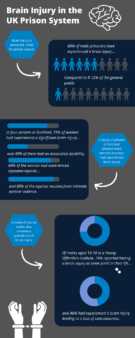ACBIS Insider: Volume 6 Issue 3
Categories: ACBIS Insider
Over-Representation of Brain Injury in Adult and Juvenile Criminal Justice Populations
The prevalence of brain injury (BI) is significantly greater in justice-involved populations, and there is an over-representation of prisoners who have likely experienced a BI during their lifetime. The Centers for Disease Control and Prevention is acknowledging that this is an unrecognized problem, as the majority of these justice-involved individuals are not diagnosed with brain injury and have not had access to neurorehabilitation, which could have helped them improve their functioning. Read more.
Best Practices Guidelines for Probationers with Brain Injury
Research has consistently demonstrated an over-representation of brain injury (BI) history among individuals who are involved in the criminal justice system. This article provides an overview of the recently completed Best Practice Guidelines for Supervising Probationers with Brain Injury. Read more.
School-to-Prison Pipeline for Children with Brain Injury: A UK Perspective
In the UK, the rate of school exclusions has been rising since 2012. Children who are excluded from school often have poorer educational achievement, poorer mental health, higher levels of unemployment, and homelessness. School exclusion is also an important predictor of future contact with the criminal justice system. Read more.
School-to-Prison Pipeline in Ethnic Minority Adolescents with Traumatic Brain Injury
The school-to-prison pipeline is the theory that the rise in punitive punishment in the educational settings and criminal justice systems is related; students are subject to disciplinary policies that decrease their chances of educational success and push them into the juvenile and, eventually, the criminal justice system. Read more.
ACBIS Spotlights
CBIST Spotlight: Christina Dillahunt-Aspillaga
Dr. Dillahunt-Aspillaga received her doctorate in rehabilitation science from the University of Florida. Christina is employed as a tenured Professor in the Department of Child and Family Studies, Rehabilitation and Mental Health Counseling program in the College of Behavioral and Community Sciences at the University of South Florida, Tampa. Her research interest areas include employment for persons with disabilities. Keep Reading.
CBIS Spotlight: Jill Ferrington
Jill has a graduate degree in rehabilitation services from Florida State University. Prior to her role as a technical assistance advisor with the National Association of State Head Injury Administrators (NASHIA), Jill led disability initiatives in the areas of brain injury, competitive integrated employment (including self-employment) for people with disabilities, and Medicaid Buy-In. Jill co-leads NASHIA’s Leading Practices Academy on Criminal and Juvenile Justice focused on infrastructure development and system capacity building for brain injury identification and support. Keep Reading.
By the Numbers
Most prisoners in the UK have experienced a brain injury of some kind. In this issue’s By the Numbers, we look at a number of studies that show just how prevalent brain injury is. Read more.


